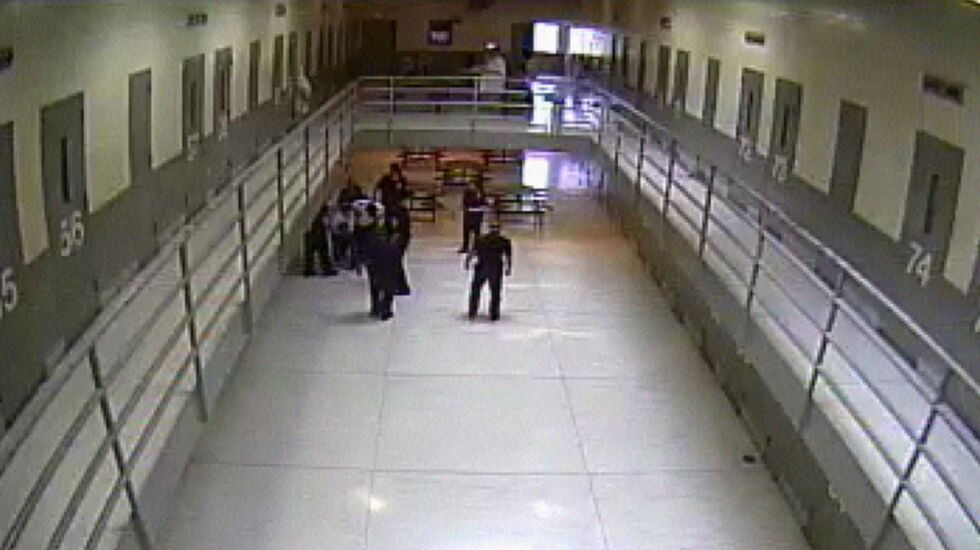
A federal judge has sentenced a former prison guard to 20 years for joining at least two other guards in fatally beating 65-year-old Larry Earvin to death at the Western Illinois Correctional Center and attempting to cover it up.
Alex Banta, 31, told the judge at his sentencing hearing in Springfield Thursday that he took the prison job when he was 23 to support his girlfriend and child and had “no idea how this job was going to change me.”
He said he was trained by superiors that there would be things that happened inside that he should ignore and that he should not put anything about fellow guards into reports. Banta said he learned that “if you don’t personally give payback to these guys, you keep your mouth shut about it.”
In handing down the sentence, U.S. District Judge Sue Myerscough acknowledged the culture of violence at the facility but said the evidence showed the guards beat Earvin while he was handcuffed and posed no threat, in an area without video cameras.
Myerscough said Banta delivered the most serious blow, “jumping up in the air and landing with both knees” on Earvin, who suffered 15 rib fractures, a punctured colon and injuries from head to toe.
Banta then repeatedly lied about the attack, the judge noted.
Earvin’s killing was part of a larger pattern of abuse at the prison uncovered by WBEZ. Testimony at the trial showed guards protected each other and looked the other way when abuse occurred, and discipline systems failed repeatedly.
Banta’s attorneys asked the judge for a 10-year sentence. Prosecutors had asked for life.
Earvin’s brother Willie Earvin testified that the two boys were close as kids and even shared a bed. He said he was glad his parents did not live long enough to know what happened to their son.
“What kind of person does it take to assault a 65-year-old man that is handcuffed?” Willie Earvin said on the stand.
Larry Earvin’s son Larry Pippion also addressed the court, saying the treatment of his father was shocking.
“It’s been overwhelming,” Pippion said. “Especially when my kids have questions.”
A federal jury convicted Banta in April of 2022 of conspiracy to deprive civil rights, deprivation of civil rights, obstruction of an investigation, falsification of a document and misleading conduct.
Two other former guards involved in the beating and cover-up are awaiting sentencing. Todd Sheffler of Mendon is scheduled to be sentenced March 20 and Willie Hedden, of Mount Sterling, on March 22. Hedden pleaded guilty and cooperated with prosecutors, which could result in a lighter sentence.
Banta’s four-week trial in spring of 2022 revealed systemic problems at Western Illinois Correctional Center. Numerous guards testified they witnessed the beating, but admitted they didn’t report it and even lied to state police about it.
A WBEZ investigation found Earvin was beaten in an infamous part of the prison where staff routinely abused prisoners because they knew there were no security cameras. An internal affairs report, written by a prison official, flagged the lack of video at that location in 2017, more than a year before the killing of Earvin.
Before Earvin’s death, nine other prisoners accused staff of beating them in a blind spot, including Roger Latimer, who told local prosecutors, state officials and healthcare workers he was beaten by Banta in a vestibule with no cameras.
When he heard about Eavin’s death, he was disturbed by the similar details. “It’s so upsetting because I tried to reach out,” Latimer said.
Earvin lived with mental illness and was homeless at the time he committed the crime that put him behind bars for three years.
According to a police report, he stole watches from a hospital gift shop, then attempted to sell them on the street to a woman. He and the woman agreed on a price – $11 – and as she was handing over the cash, he grabbed it, smacked her hand and started walking away.
Earvin died on June 26, 2018 from blunt trauma to the chest and abdomen, just a few months before he was scheduled to be released. He was buried in an unmarked grave.
Larry Pippion noted his father’s mental illness and asked, “Why was he incarcerated in the first place for such a petty theft … Why couldn’t he have been helped instead of thrown away?”
Delivering the sentence, Myerscough said through tears that Earvin’s “incarceration with mental illness is an indictment of our system.”







